True or false:
A rectangle is sometimes a parallelogram, but a parallelogram is always a rectangle.
*Be able to explain
False.
A parallelogram is not always a rectangle because it may not have 4 right angles. For example, a rhombus is not a rectangle.
In a triangle, if one angle is 36 degrees and another is 54 degrees, what does the last angle measure?
The last angle is 90 degrees.
36 + 54 = 90
180 (total degrees in a triangle) - 90 = 90
A triangle is categorized by both its sides and angles. A triangle has all sides the same length is called: (must use both names)
Acute and equilateral.
What is the surface area of the shape below:
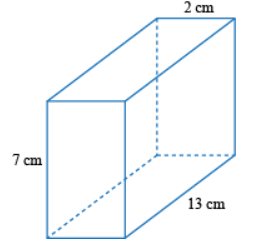
262 cm2
Shape 1: 7 x 2 = 14
Shape 2: 2 x 13 = 26
Shape 3: 13 x 7 = 91
91 + 26 + 14 = 131
131 x 2 = 262 cm2
The volume of the prism below is:
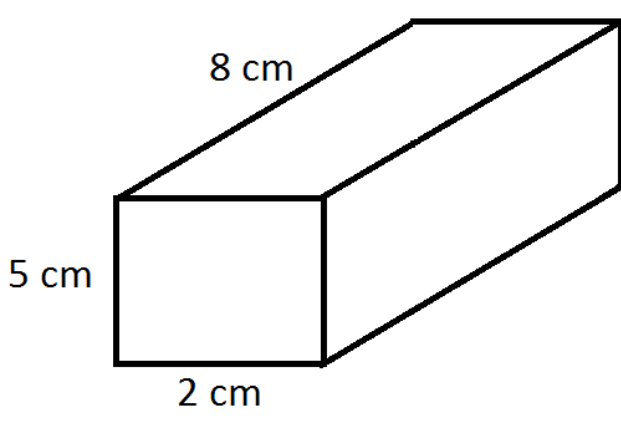
80 cm3
Volume = l x w x h
8 x 5 x 2 = 80 cm3
Remember that volume is cubed!
What is the volume of a cylinder that has a radius of 4 and height of 10?
The formula is:
Volume = height x pi x r2
502.4 units3
V = 10 x 3.14 x 42
V = 31.4 x 16
V = 502.4 units3
In a straight angle formed by 2 adjacent angles, what is the measure of one angle if the other is 147 degrees?
33 degrees
180 (degrees in a straight angle) - 147 = 33 degrees
A triangle is categorized by both its sides and angles. A triangle has 2 congruent sides and one obtuse angle is called: (must use both names)
Isosceles and obtuse.
The surface area of this prism below is:
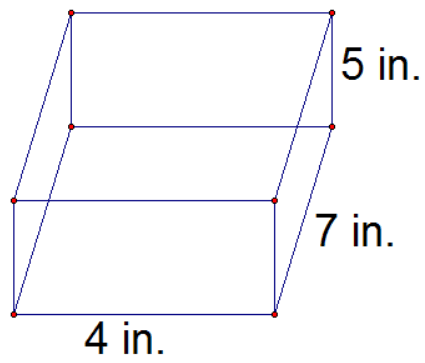
166 in2
Shape 1: 4 x 5 = 20
Shape 2: 7 x 5 = 35
Shape 3: 4 x 7 = 28
20 + 35 + 28 = 83
83 x 2 = 166 in2
The volume of the shape below is:
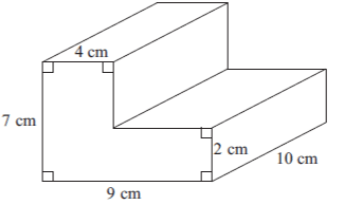
380 cm3
Shape 1 is 7 x 4 x 10 = 280
Shape 2 is 5 x 10 x 2 = 100
Total volume is 380 cm3
The volume of a shape that is 16 x 10 x 12 =
1,920 u3
Remember that if there are no units in the problem that you can always use units cubed.
A quadrilateral has 3 known angles:
108 degrees, 46 degrees, and 76 degrees
What is the measure of the last angle?
130 degrees
108 + 46 + 76 = 230
360 - 230 = 130 degrees
(There are 360 degrees total for the interior angles of a quadrilateral)
A triangle with one angle greater than 90 degrees is called:
Obtuse triangle
(There only has to be one obtuse angle in a triangle to categorize it as obtuse).
The rectangular prism below has a surface area of:
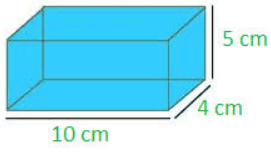
220 cm2
Shape 1: 10 x 4 = 40
Shape 2: 4 x 5 = 20
Shape 3: 10 x 5 = 50
40 + 20 + 50 = 110
110 x 2 = 220 cm2
Calculate the volume of the rectangular prism:
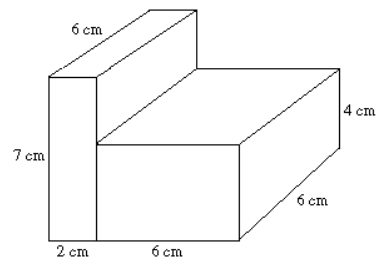
228 cm3
How many vertices are on a cube?
8 vertices
(Vertices are corners)
If one base angle in an isosceles triangle is 50, what is the measure of the other 2 angles?
80 degrees and 50 degrees.
If one base of the isosceles is 50 degrees, the other base angle is also 50 degrees. 50 + 50 = 100
A triangle's interior angles add up to 180 degrees.
So, 180 - 100 = 80 degrees.
A triangle is categorized by both its sides and angles. A triangle with a 90 degree angle and no equal sides is called: (must use both names)
Right and scalene triangle
The cube has a surface area of:
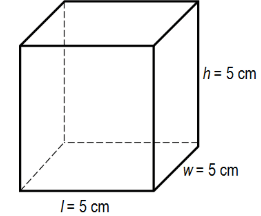
150 cm2
Shape 1: 5 x 5 = 25
Shape 2: 5 x 5 = 25
Shape 3: 5 x 5 = 25
25 x 3 = 75
75 x 2 = 150 cm2
or 25 x 6 faces = 150 cm2
What is the volume of a cube with a side length of 6 cm?
216 cm3
Volume = l x w x h
6 x 6 x 6 = cm3
What are the digits in pi to the nearest hundredth?
3.14
I drew 2 adjacent angles that are complementary. One angle is 34 degrees; what is the measure of the other angle?
56 degrees
Complementary means that the 2 angles add up to 90 degrees.
90 - 34 = 56 degrees
In a right triangle, if one side is 6cm and one side is 8 cm, what is the length of the hypotenuse?
The hypotenuse is 10.
Use the Pythagorean Theorem:
a2 + b2 = c2
62 + 82 = c2
36 + 64 = c2
100 = c2
10 = c
What is the surface area of the prism below:
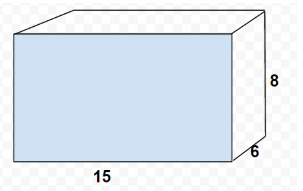
516 u2
Shape 1: 15 x 6 = 90
Shape 2: 6 x 8 = 48
Shape 3: 15 x 8 = 120
90 + 48 + 120 = 258
258 x 2 = 516 u2
How many unit cubes are in the shape below?
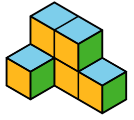
6 unit cubes
(count the cubes)